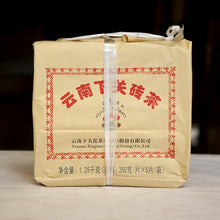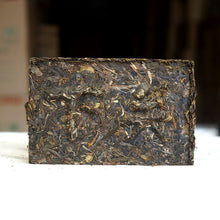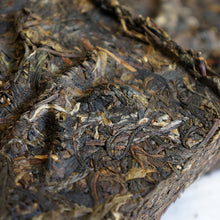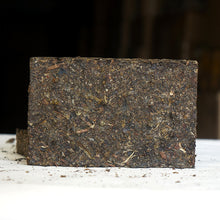
The 2017 XiaGuan "Bian Xiao Zhuan" Brick is a raw (sheng) Puerh tea, crafted with a rich history and cultural significance, particularly among the populations of Tibet, Gansu province, Inner Mongolia, and other remote regions.
Origination:
- Name and Significance: The term “Bian Xiao” translates to "Sold to remote place," reflecting the tea's historical importance in regions where vegetables are scarce and tea is a vital source of fiber and vitamin C. In these areas, tea is considered indispensable for daily life, as highlighted by the local proverb: "We can live without food for three days, but can’t live without tea for even a day."
- Tea Composition: This brick is made from the scraps left over during the manufacturing of other teas, combined with 5th-grade tea leaves on the surface. It belongs to the "BaoYan" series, recognizable by the trademark of fire on a tripod. The series includes various tea styles such as cakes, tuos, and bricks with different weights and packaging.
Taste Profile:
- Appearance: The brick features 5th-grade tea leaves as a cover, presenting a somewhat rustic and traditional look.
- Aroma: It has a classic smoky flavor characteristic of XiaGuan teas.
- Liquor: The tea liquor is yellow and clear.
- Flavor: The tea exhibits noticeable bitterness and astringency, typical of lower-grade Puerh teas. Despite this, it offers a smooth mouthfeel.
- Mouthfeel: The tea's flavor penetrates deeply into the throat, providing a satisfying and lingering experience.
- Overall: This tea is easily acceptable and appreciated, particularly by those accustomed to traditional, robust Puerh teas.
Storage:
- Guangzhou Natural Storage: The tea has been stored under natural conditions in Guangzhou, a location renowned for its favorable climate for aging Puerh tea. This method of storage helps in the gradual maturation of the tea, enhancing its flavors and overall quality.
Summary:
The 2017 XiaGuan "Bian Xiao Zhuan" Brick is a raw Puerh tea with deep cultural roots and a distinctive flavor profile. It offers a traditional, smoky taste with notable bitterness and astringency, making it a robust choice for those who appreciate classic Puerh teas. The tea's historical significance and its role in the daily lives of people in remote regions add to its unique charm and appeal.







